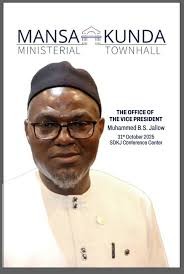
Sanna Dahaba, executive director of the National Disaster Management Agency (NDMA), outlined ongoing reforms and projects that are reshaping the agency’s disaster response framework. Established by an Act of Parliament in 2008, the NDMA chaired by the Vice President recently updated its strategic plan (2024–2033) and launched a National Disaster Risk Mitigation Plan.
Highlighting one of its most humane interventions, Dahaba announced that the NDMA is currently building 31 self-contained homes for disaster-affected families. “These are not just shelters,” he said. “They are dignified homes, especially for female-headed households, the elderly, and differently abled persons.”
On his part, Momodou Bah, director general of the Food Safety and Quality Authority (FSQA), captured the importance of his agency’s work with a simple truth: “Food is the most important commodity in life apart from the air we breathe.”
Bah explained that FSQA, established in 2011, ensures that every meal consumed in The Gambia from farm to fork is safe and nutritious. Beyond safety, he emphasised quality through food fortification programs aimed at tackling iron deficiency anemia, one of the country’s leading health challenges.
“We are not just protecting food,” Bah said. “We are protecting lives.” He also revealed that The Gambia has been elected as Africa’s coordinator for the global CODEX food standards body, a milestone that places the country on the international food safety map.
For Binta Singhateh, director of the National Early Warning and Response Mechanism Coordinating Centre (NCCRM), prevention is better than reaction. She described the center as “The Gambia’s human security radar”—a national hub that tracks potential threats, from climate and crime to governance and public health.
Operating through five thematic pillars, Singhateh said the NCCRM works closely with ECOWAS, GIZ, and UN agencies to strengthen national resilience. “Our goal is simple,” she said. “We want to act before crises strike, not after.”
Mariama Fanneh, director of the National Population Commission Secretariat, shared encouraging data from the 2024 census: 77% of Gambians are under the age of 35. She said this youthful demographic presents an opportunity if harnessed through investment in education, skills, health, and governance.
“We are transforming data into decisions,” Mofane said, referencing the National Observatory for the Demographic Dividend and the new integration software developed to help ministries plan more effectively. She added that The Gambia’s youth dependency rate is falling, “proof that our window of opportunity is open.”
Closing the session, Bakary Jallow, deputy director General of the National Nutrition Agency (NaNA), underscored the agency’s success in reducing child malnutrition and anemia through a multi-sectoral approach.
Jallow said NaNA’s efforts spanning maternal health, child nutrition, and food fortification have brought global recognition. “UNICEF and WHO recently consulted The Gambia to share our success story in reducing anemia among women,” he revealed.
He added that NaNA is also tackling the “triple burden” of under-nutrition, micronutrient deficiency, and over-nutrition, while coordinating nationwide programs to promote healthy diets and prevent non-communicable diseases.
The Mansa Kunda Townhall, a flagship initiative of the Ministry of Information, has become a powerful platform for transparency, public dialogue, and citizen engagement.





